How AI Sales Agents Streamline Your Sales Process
Your sales team is drowning in admin work.
While your competitors close deals, your reps spend hours updating CRMs, chasing lukewarm leads, and crafting the same email templates over and over. Sound familiar?
You’re not alone. Sales professionals waste over two hours daily on tasks that could be automated. That’s 10+ hours per week that should be spent actually selling.
But here’s the thing: the smartest sales teams have already found the solution. They’re using AI technology to handle the grunt work while their human reps focus on what they do best… building relationships and closing deals.
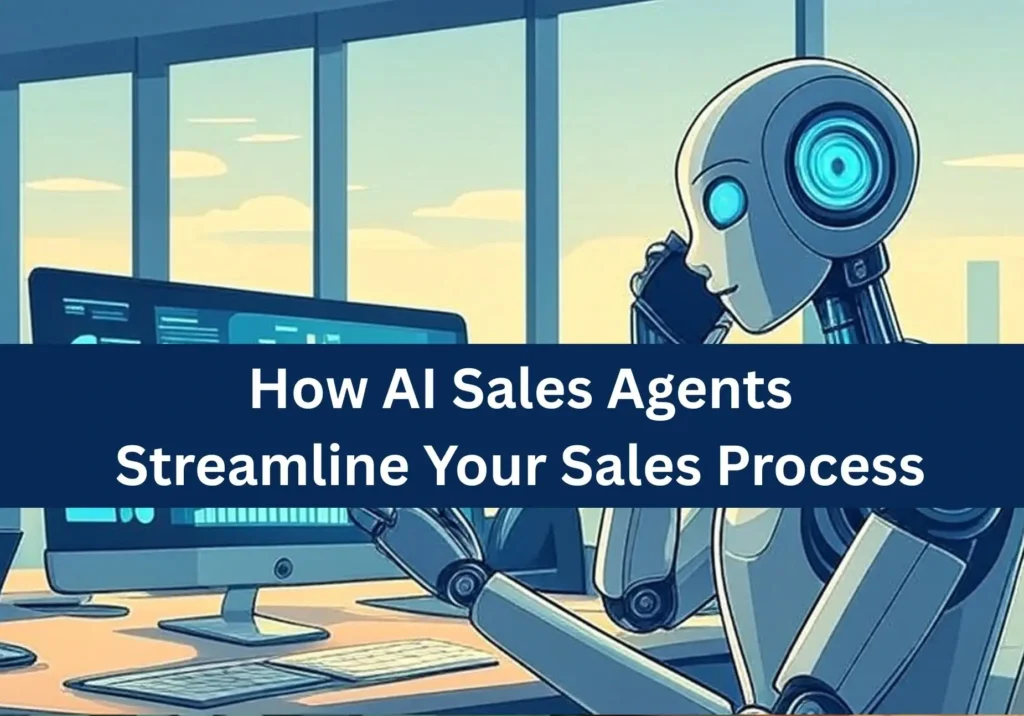
The results? Companies leveraging AI report 10-20% increases in ROI, and that’s just the beginning.
CONTENTS
Ready to see how AI can transform your sales process from a time-sucking nightmare into a revenue-generating machine? Let’s dive in.
What Are AI Sales Agents?
Think of AI sales agents as your team’s new digital assistants.
But these aren’t your typical chatbots that give robotic responses.
Modern AI sales agents combine machine learning, natural language processing, and data analytics to actually understand context, learn from interactions, and make intelligent decisions.
They’re getting scary good at mimicking human behavior.
Two Types You Need to Know
Autonomous agents work independently. They prospect for leads, send personalized emails, and even book meetings without human intervention. It’s like having a tireless sales rep who never takes a coffee break.
Assistive agents support your existing team. They provide real-time insights during calls, suggest next steps, and automate follow-ups. Think of them as your sales reps’ secret weapon.
The key difference from traditional sales tools?
These intelligent systems actually learn and adapt. Your old CRM just stores data. AI technology analyzes patterns, predicts outcomes, and continuously improves performance.
How AI Sales Agents Revolutionize Your Sales Process
Let’s get specific about where AI automation makes the biggest impact. Spoiler alert: it’s everywhere.
1. Lead Generation That Actually Works
Remember the days of buying sketchy lead lists and cold-calling strangers who hung up immediately? AI agents have changed the game completely.
These digital powerhouses scan multiple data sources simultaneously. They analyze social media activity, website behavior, company news, and buying signals to identify prospects who are actually ready to buy.
But here’s where it gets interesting. These systems don’t just find leads – they qualify them instantly. Using predictive scoring algorithms, they rank prospects based on likelihood to convert. Your sales team only talks to people who matter.
What this means for you:
- No more wasted time on dead-end prospects
- Higher quality conversations from day one
- Consistent pipeline of qualified opportunities
2. Outreach That Feels Human
Gone are the days of generic “Hope this email finds you well” messages that scream automation.
Smart AI tools craft personalized outreach that references specific pain points, recent company news, or industry challenges. They adjust tone, timing, and messaging based on prospect behavior and response patterns.
The follow-up game is where artificial intelligence really shines. While your reps juggle multiple conversations, these systems track every interaction and automatically send perfectly timed follow-ups. No more prospects falling through the cracks because someone forgot to circle back.
Multi-channel orchestration takes this further. The technology coordinates touchpoints across email, LinkedIn, phone calls, and even direct mail. Each interaction builds on the previous one, creating a cohesive experience that feels intentional, not automated.
3. CRM Management Without the Headaches
Who actually enjoys data entry? Nobody.
Your sales reps should be selling, not spending 30 minutes after each call updating contact records and logging activities. AI agents handle this automatically.
They listen to calls, extract key information, and update your CRM in real-time. Deal stages progress automatically based on conversation outcomes. Contact information stays current without manual intervention.
The real magic happens with insights. AI agents don’t just store data – they analyze it. They identify patterns in successful deals, flag at-risk opportunities, and surface action items your reps might miss.
4. Sales Analytics That Predict the Future
Traditional reporting tells you what happened last month. AI analytics tell you what’s going to happen next month.
Revenue forecasting becomes incredibly accurate when AI agents analyze historical patterns, current pipeline health, and external market factors. You’ll know which deals are likely to close and which ones need immediate attention.
Performance tracking goes deeper too. AI identifies why some reps consistently outperform others, what messaging resonates with different buyer personas, and which parts of your sales process create bottlenecks.
This isn’t just pretty dashboards, it’s actionable intelligence that drives better decisions.
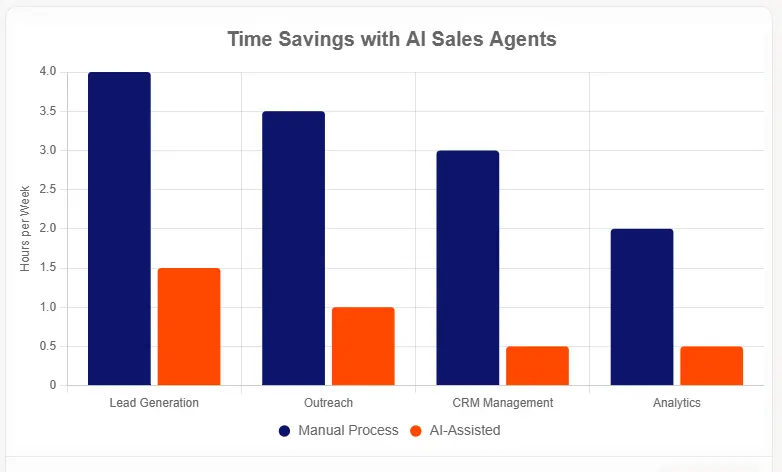
The ROI Numbers Don’t Lie
Let’s talk about what really matters: results.
Companies using AI sales agents see dramatic improvements across every metric that counts. The numbers might surprise you.
Time Savings That Add Up Fast
Sales professionals save over 2 hours daily when AI handles routine tasks. That’s 10+ hours per week returned to actual selling activities.
Do the math on your team’s hourly rate. Those time savings translate directly to revenue opportunities.
But it’s not just about quantity – it’s about quality too. When your reps aren’t bogged down with admin work, they bring more energy and focus to prospect conversations.
Revenue Impact You Can Measure
Here’s why: AI technology doesn’t just make existing processes faster – it makes them better. Higher quality leads convert at better rates. Personalized outreach gets more responses. Automated follow-ups prevent deals from going cold.
Pipeline velocity accelerates significantly. Deals move through your sales funnel faster when intelligent systems eliminate bottlenecks and ensure consistent follow-through.
Cost Reductions Across the Board
AI agents work 24/7 without salaries, benefits, or vacation time. The cost savings add up quickly, especially for high-volume activities like lead qualification and initial outreach.
Error rates drop dramatically too. AI agents don’t forget follow-ups, miss appointments, or input data incorrectly. These small improvements compound into significant cost savings over time.
Customer Experience Gets Better
Your prospects receive faster responses, more relevant information, and consistent communication throughout their buying journey.
AI agents never have bad days, don’t take personal calls during work hours, and always remember previous conversations. This reliability improves customer satisfaction and builds trust in your brand.
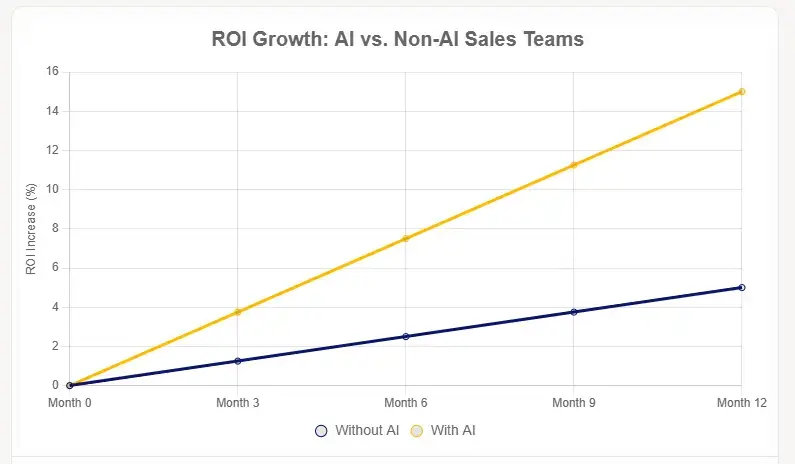
Top AI Sales Agent Tools Leading the Market
The AI sales agent space is exploding with innovation. Here are the platforms making the biggest impact in 2025.
Lead Generation Boost: McKinsey reports that companies leveraging AI for sales see nearly 50% increases in leads and appointments.
Comprehensive Platforms
HubSpot’s AI-powered Sales Hub leads the pack for mid-market companies. Their intelligent systems handle lead scoring, email automation, and pipeline management within a familiar CRM interface.
Salesforce Einstein dominates enterprise markets with deep customization options and powerful predictive analytics. The learning curve is steeper, but the capabilities are extensive.
Specialized Solutions
Outreach.io excels at sales engagement automation. Their AI agents create sophisticated multi-touch campaigns that feel personal at scale.
Gong.io focuses on conversation intelligence. Their AI agents analyze sales calls to identify winning patterns and coach reps on best practices.
Emerging Players
Clay combines data enrichment with AI-powered outreach. Perfect for teams that need comprehensive prospect research.
Reply.io offers affordable automation for smaller teams. Their AI agents handle email sequences and LinkedIn outreach without breaking the budget.
Integration Considerations
The best AI sales agent tools integrate seamlessly with your existing tech stack. Look for platforms that connect with your CRM, marketing automation, and communication tools.
API capabilities matter too. You want flexibility to customize workflows and connect additional tools as your needs evolve.
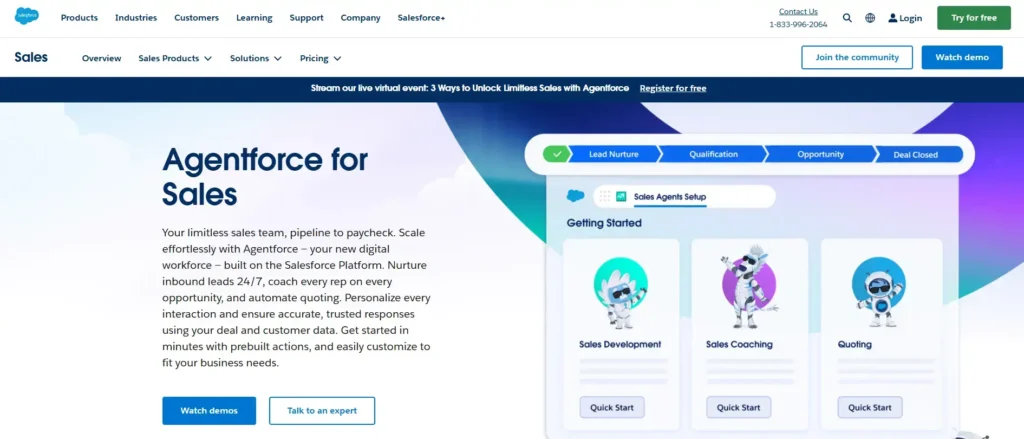
Your AI Implementation Roadmap
Ready to add AI sales agents to your team? Here’s how to do it right.
Step 1: Assess Your Current Situation
Start by identifying your biggest pain points. Where does your sales team waste the most time? Which processes consistently create bottlenecks?
Common problem areas include:
- Manual lead research and qualification
- Repetitive email outreach
- CRM data entry and maintenance
- Follow-up scheduling and execution
- Pipeline reporting and forecasting
Focus on the areas where AI can make the biggest immediate impact.
Step 2: Choose Your First Use Case
Don’t try to automate everything at once. Pick one specific process and nail it before expanding.
Lead qualification is often the best starting point. AI agents can quickly identify and score prospects, giving your team better leads to work with immediately.
Email automation comes next for most teams. Once AI agents handle initial outreach and follow-ups, your reps can focus on qualified conversations.
Step 3: Integration Strategy
Plan your integration carefully. Most AI sales agent platforms require CRM connectivity and data synchronization.
Key considerations:
- Data quality and cleanliness
- User permissions and access levels
- Workflow customization options
- Training and onboarding requirements
Step 4: Team Training and Adoption
Your sales team needs to understand how AI agents work and how to leverage them effectively. This isn’t about replacing humans – it’s about making them more effective.
Start with power users who embrace new technology. Their success stories will encourage broader adoption across your team.
Step 5: Measure and Optimize
Track performance metrics from day one. AI agents continuously learn and improve, but you need to monitor their effectiveness and make adjustments.
Key metrics to watch:
- Lead quality and conversion rates
- Time savings per rep
- Pipeline velocity improvements
- Revenue impact
Regular optimization ensures your AI agents deliver maximum value over time.
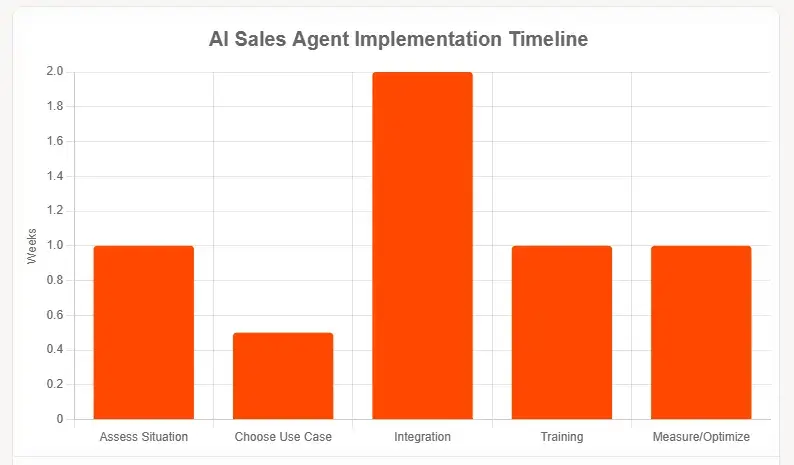
Common Implementation Challenges
Let’s be honest. Not every AI sales agent implementation goes smoothly. Smart companies learn from others’ mistakes instead of repeating them.
Here are the biggest challenges you’ll face and exactly how to handle them.
Challenge 1: Data Quality Issues
Your AI agents are only as good as the data they work with. Garbage in, garbage out.
Many companies jump into AI implementation without cleaning up their existing data first. The result? AI agents that send emails to outdated contacts, score leads incorrectly, and make recommendations based on incomplete information.
The fix: Audit your data before implementation. Remove duplicates, update contact information, and standardize data formats. Most CRM platforms offer data cleaning tools, or you can hire specialists to handle this crucial step.
Don’t skip this. Clean data is the foundation of effective AI sales agents.
Challenge 2: Team Resistance and Fear
Your sales team might worry that AI agents will replace them. This fear can sabotage implementation before it even starts.
Some reps will resist using new tools, others will find excuses why the old way works better. Without buy-in from your team, even the best AI agents will fail.
The solution: Communication and training are everything. Show your team how AI agents make their jobs easier, not obsolete. Share success stories from other companies. Let your top performers test the tools first and become internal champions.
Remember: AI agents handle the boring stuff so reps can focus on relationship building and deal closing. Frame it as career enhancement, not replacement.
Challenge 3: Integration Nightmares
Your existing tech stack wasn’t designed with AI in mind. Connecting new AI agents to legacy systems can create technical headaches.
Data synchronization problems, broken workflows, and system conflicts can derail your implementation. Some companies spend months trying to get different platforms to talk to each other.
The smart approach: Start with AI agents that integrate natively with your existing CRM. Most major platforms (Salesforce, HubSpot, Pipedrive) offer built-in AI capabilities that work seamlessly with your current setup.
For custom integrations, work with specialists who understand both your business needs and technical requirements.
Challenge 4: Unrealistic Expectations
AI sales agents are powerful, but they’re not magic. Some companies expect overnight transformations and get disappointed when results take time to materialize.
AI agents need time to learn your processes, understand your ideal customers, and optimize their performance. The biggest gains often come after 3-6 months of continuous operation.
Set realistic timelines: Plan for gradual improvements rather than instant results. Track leading indicators (like email response rates and lead quality scores) before expecting revenue impact.
Patience pays off. Companies that stick with AI implementation see compound benefits over time.
Challenge 5: Compliance and Privacy Concerns
With regulations like GDPR, HIPAA, and PIPEDA, data privacy isn’t optional. AI agents that handle customer information must comply with strict requirements.
Many companies discover compliance issues after implementation, leading to expensive retrofitting or complete system overhauls.
Plan for compliance from day one: Choose AI platforms with built-in privacy protections. Understand data residency requirements for your regions. Document your data handling processes clearly.
Work with legal teams early in the process. It’s much easier to build compliance in than to add it later.
Challenge 6: Measuring the Wrong Metrics
Activity doesn’t equal results. Some companies focus on vanity metrics like email volume or call frequency instead of business outcomes.
AI agents might send thousands of emails, but if they’re not generating qualified opportunities, they’re not adding value.
Focus on what matters: Track conversion rates, pipeline velocity, deal size, and revenue attribution. These metrics show whether AI agents are actually improving your sales performance.
Regular performance reviews help you optimize AI agent behavior and maximize ROI.
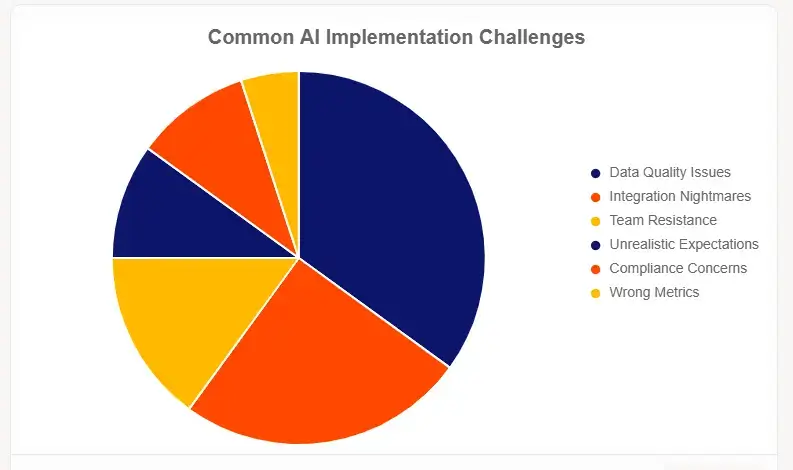
What’s Coming Next
The AI sales agent revolution is just getting started. Here’s what’s on the horizon.
Advanced Conversation AI
Next-generation AI agents will handle voice conversations with prospects. They’ll conduct initial discovery calls, answer basic questions, and even negotiate simple deals.
The technology already exists – it’s just a matter of time before it becomes mainstream.
Predictive Customer Journey Mapping
AI agents will predict entire customer journeys before prospects even enter your pipeline. They’ll know which content to share, when to make contact, and what objections to address.
This level of predictive intelligence will make sales processes incredibly efficient and personalized.
Cross-Platform Integration
AI agents will work seamlessly across all your business systems. They’ll coordinate between marketing automation, customer success platforms, and financial systems to provide complete customer visibility.
Industry-Specific Specialization
We’ll see AI agents designed for specific industries and use cases. Healthcare AI agents will understand HIPAA requirements. Financial services agents will navigate compliance automatically.
This specialization will make AI adoption easier and more effective for niche markets. Healthcare AI agents will understand both HIPAA requirements in the US and PIPEDA compliance in Canada, automatically handling sensitive patient data according to regional regulations.
Ready to Transform Your Sales Process?
The question isn’t whether AI sales agents will revolutionize sales – they already are. The question is whether your team will be early adopters or late followers.
Early adopters are seeing 10-20% ROI improvements right now. They’re closing more deals with less effort while their competitors struggle with manual processes.
Your sales team deserves better than drowning in admin work. They deserve tools that amplify their strengths and eliminate their biggest frustrations.
AI sales agents offer exactly that opportunity.
Start small. Pick one process that’s currently eating up your team’s time. Implement AI agents to handle that specific task. Measure the results. Then expand from there.
Your future self will thank you for making the leap. Your competitors might not be so happy, but that’s their problem.
The AI sales revolution is happening now. The only question left is: are you going to lead it or follow it?
We specialize in building AI growth infrastructure that transforms sales processes for businesses across North America. Our team understands the unique compliance requirements for both US and Canadian markets, ensuring your AI implementation delivers results while meeting all regulatory standards.
Discover how our AI Growth Infrastructure can streamline your sales process →
FAQs
What exactly do AI sales agents do?
AI sales agents are intelligent tools that automate repetitive sales tasks like lead generation, email outreach, CRM updates, and analytics. They use machine learning and natural language processing to qualify leads, personalize communication, and provide actionable insights, freeing your team to focus on closing deals.
Can AI sales agents replace my sales team?
No, they’re not here to replace your team but to make them more effective. AI handles the grunt work (data entry, follow-ups, lead scoring) so your reps can focus on building relationships and closing high-value deals.
How quickly can I see results from AI sales agents?
Results vary, but most companies see measurable improvements within 3-6 months. Early wins often come from better lead quality and time savings, with revenue impact growing as the AI learns your processes.
Are AI sales agents expensive to implement?
Costs depend on the platform and scale. Tools like Reply.io are affordable for small teams, while enterprise solutions like Salesforce Einstein are pricier but feature-rich. The ROI (10-20% for many companies) often outweighs initial costs through time savings and higher conversions.
How do AI sales agents handle data privacy and compliance?
Top platforms are built with compliance in mind, supporting regulations like GDPR, HIPAA, and PIPEDA. Choose tools with robust privacy features and work with legal teams to ensure data handling meets regional standards.
What’s the best AI sales agent tool for a small business?
For small businesses, Reply.io and Clay offer cost-effective solutions with powerful automation and outreach capabilities. HubSpot’s AI-powered Sales Hub is also great for growing teams needing an all-in-one CRM.
How do I convince my sales team to adopt AI tools?
Focus on benefits: less admin work, better leads, and more time for selling. Start with a pilot program using top performers as champions. Share success stories and provide hands-on training to ease fears of job replacement.
Can AI sales agents integrate with my existing CRM?
Yes, most leading tools like HubSpot, Salesforce Einstein, and Outreach.io integrate seamlessly with popular CRMs. Check for native integrations or API support to ensure smooth data flow and workflow customization.
What’s the biggest challenge when implementing AI sales agents?
Data quality is often the top hurdle. Clean, standardized data ensures AI agents perform accurately. Other challenges include team resistance and integration issues, which can be mitigated with proper planning and training.









